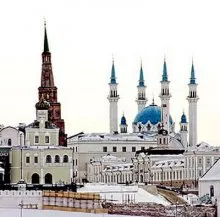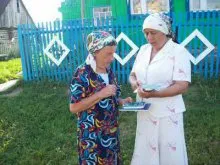

In the Kryashen biblical translations Muslim terminology is carefully avoided and is replaced by Russian borrowings and ancient pre-Tatar words. However good and suitable for their own isolated ethno-confessional church usage these translations may be, they are not at all intended to be read by the Tatar population at large. What is specific to our Tatar Bible translation project is the use of contemporary Tatar vocabulary, which presupposes that all the names and key terms follow Muslim tradition comprehensible for everybody.
“It was a great challenge for us to find the proper ways of expressing things untypical of our national culture”, one of IBT translators said. “As a result, the words that we have finally chosen make it evident for every Tatar reader now that ‘Christ’ means Messiah and is not at all the name of “the Russian God”, that “baptism” means immersion in water and is not at all the swear word into which the Russian word “christened” has turned in modern Tatar, and that the meaning of sanctification to which Moses or Joshua called the people of Israel was purification and not at all some unknown ancient Jewish rite”.

IBT Russia/CIS is a non-profit organization financed through contributions from individuals, sponsoring organizations and foundations.
You can donate to IBT:
Through: AO UniCredit Bank, Moscow
SWIFT: IMBKRUMM
In favour of: Institute for Bible Translation
Address: 119334, Russia, Moscow, Andreevskaya nab. 2
TIN (INN) 7736231521
9-digit Bank identification code in Russian banking system: 044525545
Account no. (IBAN):
634261 USD 4020 02 001 or 40703840700010142881
634261 EUR 4020 02 001 or 40703978700010366720
634261 GBP 4020 02 001 or 40703826600010366723
Through: NOSTRO ACCOUNTS OF AO UNICREDIT BANK, MOSCOW:
USD JPMORGAN CHASE BANK N.A., NEW YORK SWIFT CODE: CHASUS33
EUR UNICREDIT BANK AG (HYPOVEREINSBANK) , MUNICH SWIFT CODE: HYVEDEMM
EUR UNICREDIT BANK AUSTRIA AG, VIENNA SWIFT CODE: BKAUATWW
EUR UNICREDIT S.P.A., MILANO SWIFT CODE: UNCRITMM
GBP THE ROYAL BANK OF SCOTLAND PLC, LONDON SWIFT CODE: RBOSGB2L
Important! In the field "designation" write "CHARITY DONATION"
For more information address IBT
You may sign up to receive our Russia/CIS monthly English newsletter here
